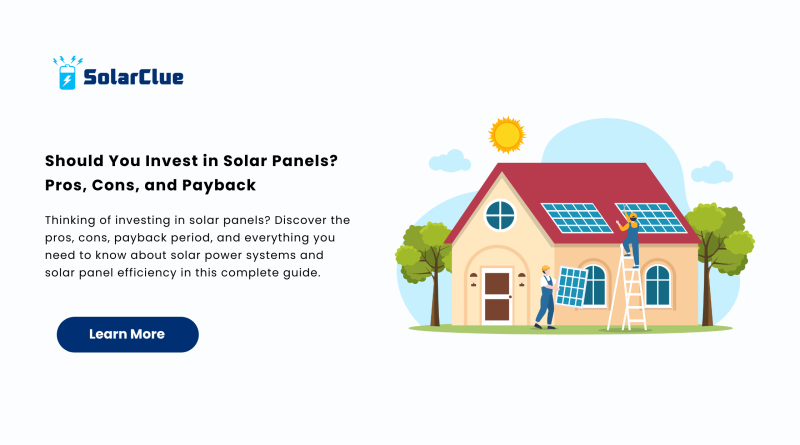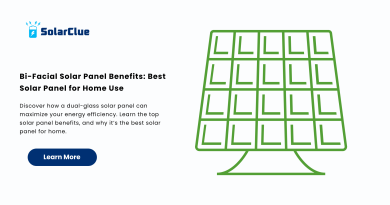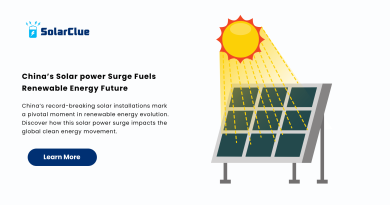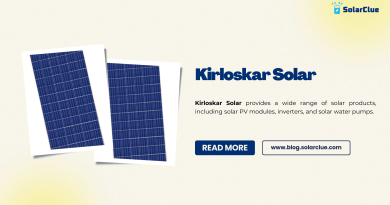Should You Invest in Solar Panels? Pros, Cons, and Payback
If you’ve ever wondered should you invest in solar panels, you’re not alone. With rising electricity costs, frequent power outages, and growing environmental concerns, many homeowners and businesses in India are turning to solar power systems. But is it the right move for you? In this guide, we’ll explore the real benefits, challenges, and the return on investment of going solar—so you can make a well-informed decision.
Table of Contents
What Is a Solar Power System?
A solar power system converts sunlight into electricity using photovoltaic (PV) solar panels. These systems can power homes, commercial buildings, and even industrial setups. They reduce your dependence on the grid and lower your electricity bills significantly over time.
The key components include:
-
Solar Panels (to capture sunlight)
-
Inverter (to convert DC to AC)
-
Battery (optional, for backup)
-
Mounting Structure
-
Monitoring System
Pros of Investing in Solar Panels
1. Save Big on Electricity Bills
Installing a solar power system slashes your energy bills from day one. Over time, these savings add up significantly, especially if your monthly bill is high.
2. High Return on Investment (ROI)
The payback period for solar panels typically ranges from 3 to 5 years in India. After this, you enjoy free electricity for 20+ years. This makes solar one of the best long-term investments today.
3. Environmental Impact
Switching to solar power means reducing your carbon footprint. Solar panels produce clean energy without emitting greenhouse gases, making them a powerful tool in the fight against climate change.
4. Low Maintenance
With no moving parts, solar panels require minimal maintenance. A simple cleaning once every 2–3 months keeps them efficient.
5. Increase in Property Value
Properties with solar power systems are in demand and often sell at a premium. Future buyers love the idea of reduced power bills and green energy.
6. Government Incentives
Subsidies of up to 40% on rooftop systems, tax benefits, and easy loan options make solar more affordable than ever.
Cons of Solar Panels
1. High Upfront Cost
The initial cost of buying and installing the best solar panel system can be substantial. However, with falling prices and subsidies, this is becoming less of a hurdle.
2. Weather-Dependent Performance
Though solar panels work on cloudy days, their output reduces without direct sunlight. Still, India’s sunny climate makes this a minor issue.
3. Space Requirements
You’ll need a shadow-free space—preferably on your rooftop—for optimal performance. Limited roof area can affect how many panels you can install.
4. Efficiency Degradation
While solar panel efficiency has improved, panels lose some output each year. However, top brands now guarantee over 80% performance even after 25 years.
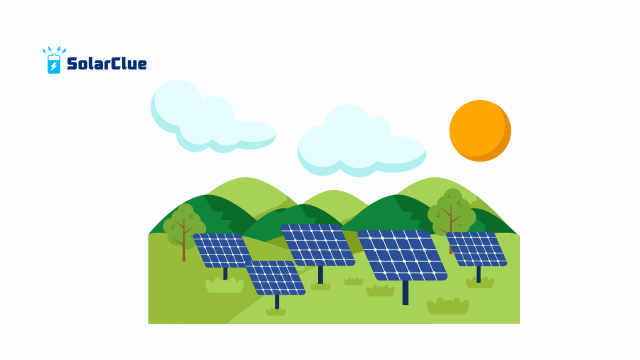
How to Calculate Solar Panel Payback Period
To determine how long it will take to recover your solar investment:
Payback Period = Total System Cost ÷ Annual Savings on Electricity
Example:
-
System Cost: ₹1,50,000
-
Annual Savings: ₹30,000
-
Payback = ₹1,50,000 ÷ ₹30,000 = 5 years
After 5 years, your system essentially pays for itself and generates free electricity for the next 15–20 years.
Are Solar Panels Worth It in India?
Absolutely! With abundant sunlight across most parts of India, investing in solar panels is a smart move. Whether you’re a homeowner or business owner, switching to solar power not only cuts your bills but also helps you contribute to a sustainable future.
Here’s why it’s worth it in India:
-
Over 300 sunny days per year
-
Rising electricity tariffs
-
Government push for renewable energy
-
Improved solar panel efficiency
-
Better battery storage options
Tips for Maximizing Solar ROI
-
Choose the best solar panel brand with a high efficiency rating (above 18%)
-
Install panels at the correct tilt and direction for maximum sunlight exposure
-
Keep your panels clean and check performance through an app or display
-
Go for net metering to earn credits for excess electricity sent to the grid
-
Consider adding a battery if power outages are frequent in your area
Top Long-Tail Keywords to Consider
-
solar panel investment in India
-
solar payback period calculator
-
advantages of solar power systems
-
solar energy savings for home
-
best solar panel with high efficiency
-
is solar power worth it for my home
-
solar panels pros and cons India
Frequently Asked Questions (FAQs)
Q1. Is solar energy reliable during power cuts?
Yes. If you opt for a solar system with battery backup, you’ll have power even during outages. Grid-tied systems without batteries don’t provide backup during blackouts.
Q2. How much does a typical residential solar system cost in India?
A 3kW system may cost around ₹1,50,000 to ₹2,00,000 after subsidy. It depends on the brand, inverter, battery, and installation.
Q3. What is the average lifespan of a solar panel?
Most solar panels last 25–30 years. Even after this, they still generate electricity at reduced efficiency.
Q4. Can I run an air conditioner using solar panels?
Yes. With proper system sizing, you can easily run heavy appliances like ACs, refrigerators, and water pumps using solar power.
Q5. How can I track my solar system’s performance?
Modern systems come with app-based monitoring that shows real-time generation, savings, and usage data.
Conclusion: Should You Invest in Solar Panels?
If you’re still asking should you invest in solar panels, the answer is clear—yes, provided you have the space, budget, and plan to stay at the property for at least a few years. It’s not just a financial investment—it’s an investment in the environment, energy independence, and long-term savings.
To explore personalized solar solutions and find the best solar panel options for your home or business, visit solarclue.com or dive deeper with expert insights at blog.solarclue.com today.

